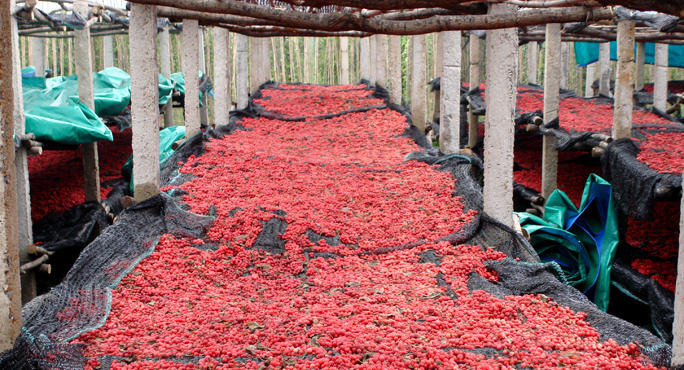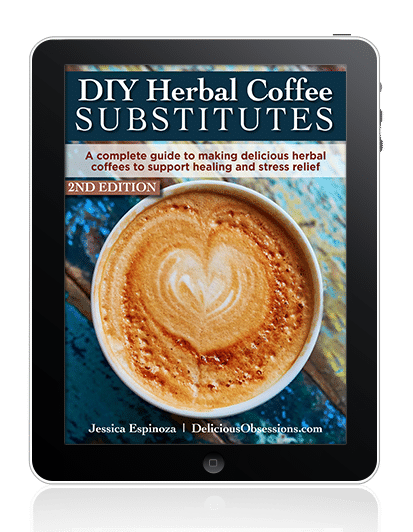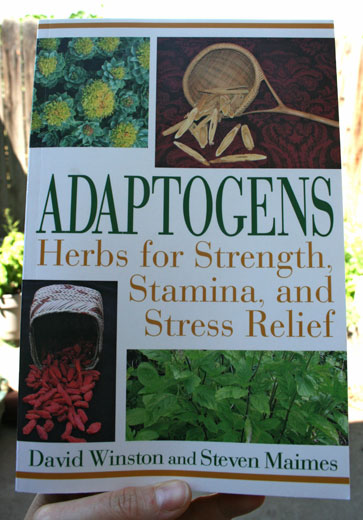FTC Disclosure: Delicious Obsessions may receive comissions from purchases made through links in this article. As an Amazon Associate I earn from qualifying purchases.Read our full terms and conditions here.
Feature Image at Top: Schisandra Berries drying in China | Image Used with permission of Chris Kilham of MedicineHunter.com
(I highly recommend this website! Tons of great info!)
Welcome to another installment in my multi-part series, where I am discussing adaptogens and how I am using them to help me on my healing journey. You can read about my journey to health here. If you’re just tuning in to this series, you can read the following articles on the subject of adaptogens:
- Adaptogens: Herbs for Vitality – An Overview
- Adaptogens: Herbs for Vitality – American Ginseng
- Adaptogens: Herbs for Strength, Stamina, and Stress Relief: A Book Review
DISCLAIMER: Due to the FDA and FTC laws on health claims, I need to make this very clear. None of the information in this post is to be construed as medical advice. I am not a doctor or certified medical practitioner of any sort. I am simply sharing my own personal experiences, as I travel the long road to optimal health. Statements/products discussed have not been evaluated by the Food and Drug Administration (FDA) and are not intended to diagnose, cure, treat, or prevent any disease or illness. Every person is different and you should always consult your own certified health care practitioner before making changes to your current diet or before beginning any herbal or vitamin supplement regimen or exercise program.
Before we start, I want to share a few things.
- No matter how much one can learn about herbs on their own, through books and the Internet, there is always a TON of value in working with a trained herbalist. It’s no different than seeking medical advice from a doctor or naturopath. Trained herbalists bring a lot of experience and insight from their practice that we do not otherwise have access to.
- Many herbs work synergistically with other herbs, so even though I am going to outline individual herbs in this series, keep in mind that most of them, if not all, are going to work best when they are combined with other compatible herbs. This is also an area where an herbalist’s training and skill can take healing to a whole new level, because it can vary from person to person. That said, there is also the practice of “simpling” and it offers a lot of value, especially when starting out. This is where you focus on using just one single herb for an extended period of time. According to herbalist, Brigitte Mars, the art of simpling allows you to “deeply connect with all the aspects of a plant’s power and to learn more about the unique flavor and properties of that individual plant.”(5)
- Not all herbs are suitable for everyone, since we are each unique. All of the herbs that I am featuring in this series fall into the “generally regarded as safe” category, but that does not always mean they are safe for everyone. It’s always a smart idea to check with your own doctor, naturopath, etc., before introducing new things into your diet or supplementation regimen.
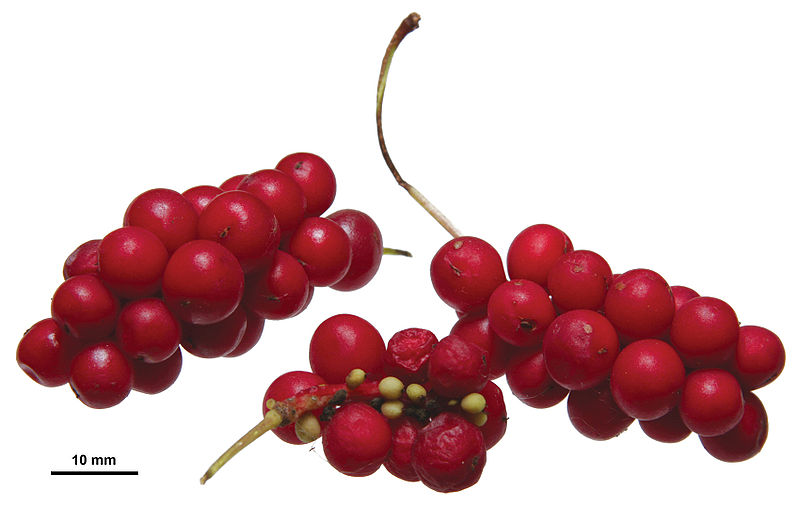 Fresh Schisandra Berries | Image Courtesy of Wikimedia Commons and Vladimir Kosolapov
Fresh Schisandra Berries | Image Courtesy of Wikimedia Commons and Vladimir Kosolapov
Schisandra Berries (Schisandra chinensis)
Schisandra was a new adaptogen to me when I started researching, as I had never even heard of it. Come to find out, it has a long history in Traditional Chinese Medicine (TCM). Chinese folklore says that this herb can “calm the heart and quiet the spirit“. It is native to Russia, Northern China, and certain areas of Korea. You can find it as an ornamental plant throughout various parts of the world. It’s a woody vine with pink, oval-shaped flowers, and bright red berries.(2)
In ancient China, it was used by royalty to help prevent aging and improve reproduction. Russian pilots used it to help them tolerate low-oxygen levels when flying at high altitudes in the 1940s.(3) Schisandra berries have also been used traditionally in Russia by hunters to help combat fatigue.(2) The berries have high levels of antioxidants and is considered one of the most highly protective of all medicinal plants. The berries are often incorporated into a variety of herbal formulas.(1)
The taste/energy of this berry is sour, sweet, salty, bitter, and pungent, warm, and dry. It is called the “five flavors fruit” because it encompasses all the flavors. Just out of curiosity, I ate a couple of the dried berries and they are definitely sour and bitter, but not super unpleasant on my taste buds. I wouldn’t sit down and eat a handful, but when compared with my tasting of the plain American ginseng, I’ll take this berry any day!
The fruit and the seeds are the parts of the plant that are used in herbal medicine. According to David Winston and Steven Maimes, this is typically a very safe herb with very few side effects. In TCM, it is not recommended to use if the person has an acute bacterial or viral infection. In animal studies, it has been shown to increase the effect of barbiturates, so use caution if you’re on those types of medications.(3)
Years of research and use in TCM has found that Schisandra may help:
- Dry up excess fluids in the body
- Reduce inflammation
- Regenerate hepatocytes (liver cells)
- Increase glutathione (an essential liver antioxidant)
- Promote healing of a damaged liver
- Mildly stimulate the central nervous system and enhance reflexes, mental activity, and work performance
- Calm and relieve anxiety, heart palpitations, and stress-induced asthma
- Support proper endocrine function
- Support immune function
- Improve resistance to stress
- Boost energy and reduces fatigue
- Normalize blood pressure, whether it be by lowing high levels or raising low levels
There is a great video interview with Chris Kilham of Medicine Hunter about Schisandra. They have embedding turned off, so click here to watch it.
How Are Schisandra Berries Used?
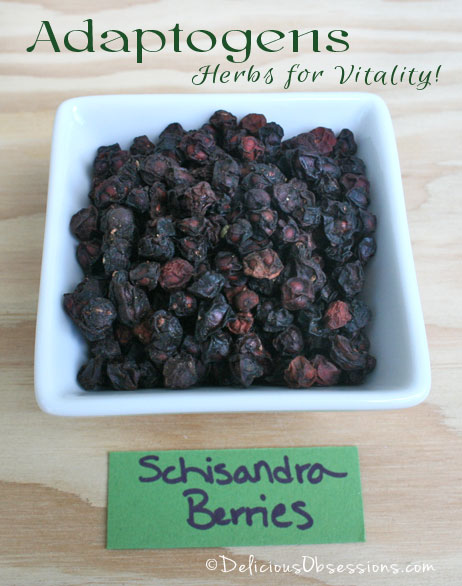
This widely used herb can be used as a supplement or as a food. In Nepal, they grow and use it as a food, rather than a medicine.(3) If you are pregnant or lactating, it is advised that you consult with a trained herbalist before using. It is generally regarded as safe. The most common ways to use Schisandra are:
- Tinctures
- Decoctions
- Capsules
I chose Schisandra to experiment with for several reasons, including its suggested ability to reduce inflammation, support immune system and liver function (including the production of glutathione), and balance blood pressure levels. I personally have been using dried Schisandra berries as a tea. It is delicious as a tea and blends nicely with other herbs and adds a nice tart, tangy flavor to the tea. It is not at all unpleasant. I have also made a tincture with the Schisandra, but it’s not quite ready to use yet. I have not noticed any specific improvements from this herb, however, because it is so delicious in tea, it will be one that I can easily incorporate into my diet long-term, and as I have mentioned before, most adaptogens work best over a long period of time. I drink herbal tea every day, and I find that it is the easiest way for me to get herbs into my body.
Supporting a Your Stress Response, Adrenals, Thyroid, and Whole Body Through Herbs
When it comes to supporting overall wellness, herbs are a great tool to have in your toolkit, especially those who may be dealing with chronic illness of some type. Since 2009, when I started this site, I have met thousands upon thousands of people through my work and by far, the #1 health complaints are:
- adrenal fatigue (or adrenal dysfunction of some sort) (click here to read all of my adrenal health articles)
- thyroid disorders (hypo-, hyper-, or autoimmune) (click here to read all of my thyroid health articles)
Because of this, I wanted to add in a section into this post about the benefit of using herbs with chronic illness. Adaptogens are by far one of the most used herbs when it comes to working with people who have low energy, fatigue, and overall imbalance in the endocrine system (thyroid, adrenals, and blood sugar).
While the benefits of adaptogenic herbs extend far beyond just supporting that one system, this tends to be one of the main reasons people turn to adaptogenic herbs in the first place. That said there are a lot of other herbs out there that offer amazing support for the body, especially those dealing with chronic illness which is why I wanted to share this section today.
If you are dealing with any type of chronic illness, I’m sorry to break it to you, but caffeine may not be your best friend. 🙁 While you can find lots of info online in both the pro- and the anti-coffee camps, the fact of the matter comes down to the fact that are a lot of people dealing with chronic illness, especially thyroid and adrenal problems, that simply cannot tolerate coffee and caffeine.
While those with sluggish adrenal glands tend to feel run down and in need of a regular pick-me-up (like coffee and other caffeinated beverages), in the long run, caffeine can do more harm than good while you are healing. I go into the “whys” around caffeine and your adrenals in this detailed post here. In addition to the caffeine, there are other constituents, molds, and mycotoxins that can show up in coffee that some people find they react to and can further exacerbate the toxic load on the body.
When I was diagnosed with autoimmune disease and adrenal fatigue, one of the first things that had to go was coffee. In addition to dealing with these issues, we suspected that I was having some detox pathway sluggishness so we wanted to also focus on supporting the liver and lymph systems. Most people who are dealing with chronic illness are also going to have issues with detoxification of the body, which is why herbs can play such an important role.
To be honest, I never drank coffee because of the caffeine. I drank coffee for the taste and aroma, as well as the emotional experience I felt to my morning cup of joe. For me, it was a ritual that I looked forward to every day (and sometimes multiple times a day). Whether I was brewing it at home or going to my local coffee shops, the experience was one that I clung to tightly.
But, when I was faced with new health struggles, I knew I had to do whatever I could to support my body and give it the tools it needed to heal. Giving up coffee and caffeine was one step in this direction.
And it sucked.
I turned to the coffee substitutes on the market in a desperate attempt to recreate the ritual I had grown so fond of, but nothing ever tasted the way I wanted it to. Nothing ever gave me that same experience that my cup of “real” coffee did. I knew there had to be something better, but I simply could not find it on my health food store’s shelves.
Necessity is the mother of invention so that is why I created my own coffee substitutes. They were made with organic, sustainably harvested herbs with zero grains, zero gluten, and zero caffeine. Just herbs.
Herbs that not only tasted delicious but supported my body’s function, like liver detox, bile production, digestion, etc. All of the herbs used in my “coffee” blends have been used for thousands of years to support the body’s normal functions and help everything work a little better — something we all need in today’s toxic world! (psst, dandelion is one of the herbs!)
When it came to creating these blends, if I could get something to not only tasted amazing (and helped me recreate my dearly loved ritual), but also did amazingly supportive things for my body, then it’s a no brainer!
I sold these pre-made blends on Etsy for awhile and the demand was more than I could keep up with. People literally LOVED these blends and were stunned at how much like coffee they actually tasted. Customers who had been dealing with a variety of chronic illnesses had given up coffee to heal their bodies, but like me were deeply missing their morning cup of joe ritual.
After careful consideration and work with some highly experienced advisors, I decided to stop selling the pre-made blends and instead share my proprietary recipes in the form of an eBook. That way I could arm people with the knowledge and recipes they needed to make their own caffeine-free, gluten-free, grain-free blends in the comfort of their own home.
That is why I created the best-selling DIY Herbal Coffees eBook: A Complete Guide To Making Delicious Herbal Coffees to Support Healing & Stress Relief.
Now in its second edition, this ebook features:
- All of my proprietary herbal blend recipes to you can craft a homemade herbal cup of “coffee” at home.
- A ton of researched information about coffee’s impact on the health of those dealing with issues like adrenal fatigue, blood sugar dysregulation, autoimmune disease, thyroid disease, and any other chronic illness.
- Information about all of the herbs used, why I selected them, how to source them, how to prepare and store you “coffees”, and much more.
- Access to your own personal coffee shop where I show you how to recreate your favorite coffee shop drinks and pastries with wholesome, nourishing real food ingredients. No junk here. Only real food.
This book truly is a comprehensive guide to supporting your health, reducing your stress, and bringing a little something special back into your healing journey. You can learn more and download your own copy of this revolutionary wellness guide here, or simply click on the image below.
Further Reading
If you are looking for more info on adaptogenic herbs, I HIGHLY recommend this book, Adaptogens: Herbs for Strength, Stamina, and Stress Relief. It is one of my all-time favorite herb books and probably the one I reference the most. Find it on Amazon here.
Basic Herbal Preparations
If you’re new to herbs and are feeling confused about all the different preparations for them, don’t be! Let me help you out with this Basic Herbal Preparations post. You can also watch the videos below to learn more about a couple herbal preparations and about my favorite source for organic, sustainably harvested herbs.
Ready to Learn More?
Stay tuned for more herbal profiles! I will continue writing about the specific adaptogens that I am using in my healing journey. There are a lot of adaptogens out there, but the key is finding ones that work well for your needs. If you like what you’ve read here, please keep in touch! You can subscribe to my semi-monthly newsletter or subscribe to email updates so you never miss a new post. You can also find me on Facebook, Twitter, Pinterest, and Google+. Have a question? Contact me here.
If you’re interested in learning more about herbs and would like to know who I recommend, check out my Resources page.
My friend Lydia of Divine Health From the Inside Out recently wrote a great post on Schisandra Berries, as well as a delicious sounding recipe for tea!
References
1. “Schisandra“. MedicineHunter.com
2. “Schisandra Berry Root and Powder Profile“. Mountain Rose Herbs.
3. “Adaptogens Herbs for Strength, Stamina and Stress Relief”. David Winston and Steven Maimes. Healing Arts Press, 2007.
4. “How to Use Fertility Herbs To Enhance Your Fertility Naturally“. Natural Fertility Info.
5. “The Desktop Guide to Herbal Medicine: The Ultimate Multidisciplinary Reference to the Amazing Realm of Healing Plants, in a Quick-study, One-stop Guide”, by Brigitte Mars. Basic Health Publications, 2007.

